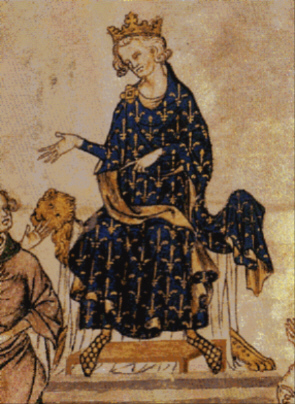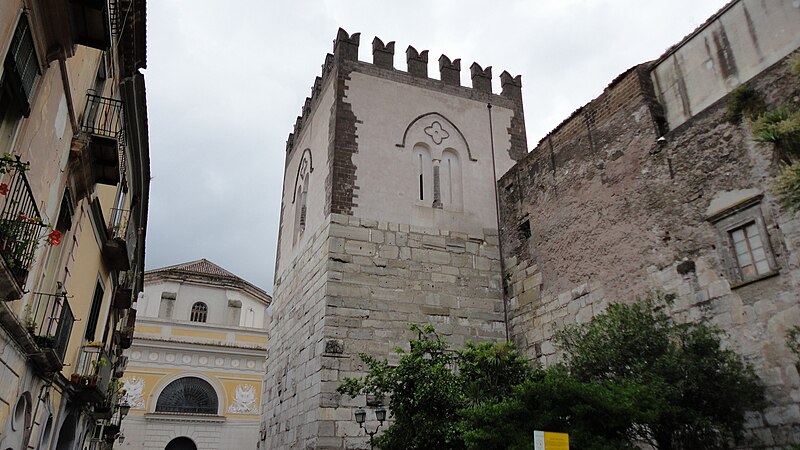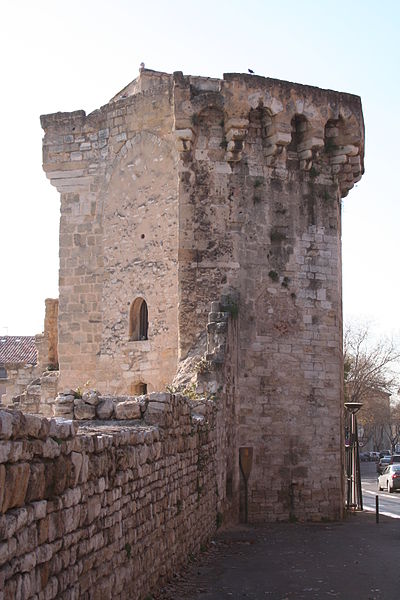 |
| Philip VI |
The Balance of Power
The English
invasion of France and the victory at Crécy altered the balance of power in
Europe. Centred in Avignon, Clement started funding Philip VI to the tune of
592,000 gold florins [i]in an attempt to stabilise
the situation. Edward III in turn was encouraging Louis to invade Naples, a
close ally of France.
Clement
tried to forestall any such attempt by Louis and started to suggest that
Charles Martel should be removed from his mother’s care and brought up in
Avignon; he also gave permission for his legate Cardinal Bertrand de Deux to
prosecute and execute any member of the Neapolitan royal family including
Joanna if found complicit in Andrew’s murder.
On 4th
October Joanna’s aunt Catherine died; if not involved in Andrew’s murder, she
certainly influenced events after his death. When Robert of Duranto rode out of
Castel Nuovo, to attend his mother’s funeral; Joanna had his retainers evicted
and shut the doors of the castle, thus eliminating one very unwanted suitor.
In Robert’s
place came four Clarissan nuns and Cardinal de Dreux. The cardinal’s arrival
meant that Joanna could no longer protect Philippa and Sancia who were executed
on 29th December after prolonged torture,
‘After that she [Sancia] was
paraded here and there, stretched out on red hot coals and tortured with pliers
until her internal organs burned and she breathed her last.’[ii]
But neither
woman implicated Joanna in Andrew’s death. But their deaths altered nothing as far
as the Hungarians were concerned. Louis sent a formal declaration of war to
Avignon on 27th March 1346. His intransigence was not appeased by de
Dreux’s finding of not guilty against the Neapolitan royal family and Joanna’s
refusal to surrender her son to the tender
mercies of the church.
Joanna set
about rallying her family; Louis of Taranto was named vicar-general of the
kingdom on 20th June, three days later Charles of Durazzo was named
captain-general. Louis and Joanna were married on 22nd August 1347
without the necessary dispensation from the church. Robert of Taranto was
appeased by a dispensation from Clement to marry Marie of Bourbon, widow of Guy of Lusignan[iii] and a wealthy woman in
her own right. From now on Robert focussed his attentions on his wife’s
properties in Achaea.
The Magyar Invasion
| South-east Europe circa 1360 |
Louis
invaded Naples at the end of 1347[iv]; his advance forces
reached the northern borders of the kingdom in late June and were welcomed by
rebellious barons. Charles of Durazzo made a stand at L’Aquila but was driven out by superior numbers. Charles along with Louis and his
brother set about raising an army to defend the kingdom. Joanna was left in
Naples, pregnant.
When the
moment came Charles and Robert decided that the only way forward was to
surrender and rode to Naples to prepare for the coming of the victor, leaving
Louis of Taranto to fight alone. On 15th January 1348 the Hungarian
troops[v] defeated those of Louis of
Taranto at Capua.
When her two
cousins rode into Naples Joanna’s thought was to flee; she knew that death
awaited her at the hand of Louis of Hungary. She was unable to remove Charles
Martel from the care of Andrew’s nurse. Feeling that her only option was to
leave her much loved son behind in her beloved Naples, and hoping in return
that the victorious Hungarians would look after Charles Martel, Joanna left
taking as much cash as she could and set sail for Avignon.
Joanna’s
flight became known to her husband who was persuaded to follow his wife into
exile. Louis was most likely to execute Louis of Taranto who left Capua under
the command of Hugo del Balzo. He took flight in a fishing boat and headed for
Florence with Niccolo Acciaioli.
Retribution
 |
| Fortress at Capua |
Louis
marched his army down to Naples, as his troops marched past Capua the German
mercenaries, hired to defend the city, deserted and the city was forced to
surrender. The following day Louis took Aversa and sent to Naples demanding his
nephew Charles Martel be handed over into Hungarian control. This was done
immediately;
‘It was Sir Amelio del Balzo
who was taking care of Lord Charles Martel – they assigned him to Count Ciccono
of Hungary, who received him [Charles Martel] in the name of the King of
Hungary, and they even assigned him [Count Ciccono] the Castel dell’Ovo.’[vi]
On the same
day as his brother fled the kingdom, Robert of Taranto and his cousin Charles
entered Aversa at the head of a procession of Neapolitan nobles to make formal
obeisance to their new monarch. Louis chose the site of his brother’s
assassination as the meeting place with his cousins. He greeted them in a
friendly fashion and promised a great banquet in their honour on 22nd
January.
At the
promised feast the two men and their brothers were arrested; in the morning of 23rd
January 1348 Charles of Durazzo was beheaded on the site of Andrew’s untimely
death. Louis then led his army down to despoil the capital city. On the 2nd
February Charles Martel was sent, with his four cousins of Taranto and Durazzo,
to Hungary. Charles Martel died on 10th May 1348, soon after
arriving in Hungary following an arduous journey.
The Trial
 |
| Aix-en Provence |
As Countess of Provence Joanna based herself in Aix-en-Provence, the province’s capital while the Black Death was raging through the area[vii]. Joanna wrote to Clement
begging him to clear her name of the taint of murdering her husband. She also
asked for support in regaining her kingdom. Clement meanwhile was receiving
letters from Louis demanding that Joanna be deposed and executed.
Soon
afterwards Maria and her children arrived in Avignon too, and took up residence
with Cardinal Talleyrand, her dead husband’s uncle. Talleyrand was able to
mobilise the French faction of the Sacred College[viii] on Joanna’s behalf and
Clement finally agreed to meet with Joanna, who arrived in Avignon on 15th
March 1348. Joanna agreed to be tried for her alleged part in Andrew’s murder.
Joanna
defended herself in the trial conducted by two of Louis’ ambassadors; Clement,
who made no secret of his taste for beautiful women, was more than happy to
pronounce her innocent. Honoré Bouche[ix] wrote;
‘She spoke at length with
such grace and eloquence, brought forth so many good reasons for her defence,
that……His Holiness was impelled to declare her innocent of the crime and of the
suspicion of the crime.’[x]
Clement
issued a bull legitimising Joanna’s marriage to Louis of Taranto and on May 7th
wrote to Cardinal de Deux informing him that he was to deny Louis’ request to
be crowned King of Naples. Louis had transgressed by illegally removing Charles
Martel from the kingdom and executing the innocent Charles of Durazzo.
The Return
 |
| Danse Macabre |
In an
attempt to uncover the accomplices in his brother’s murder King Louis instigated
a reign of terror in Naples. Although supported by the del Balzo family, Louis
was woefully short on local intelligence and, among other land grabs, seized
the property of the Pipini brothers which resulted them transferring their
allegiance to the loyalists.
The plague
arrived in Naples in April and on May 24th Louis departed from
Naples in stealth, leaving misery and chaos in his wake, as well as an empty
treasury. But the war between Hungary and Naples was to continue until 1352.
Now Joanna
needed cash to regain her kingdom. Refilling Joanna’s treasury was not
something Clement was prepared to do without some return for his money. Joanna
had to sell a portion of her birthright to get the money to return home. On 9th
June Joanna sold the pope the city and county of Avignon for 80,000 gold florins[xi] and on 23rd Clement
issued a bull allowing Joanna one tenth of church income in Provence for her
return to Naples.
 |
| Castello di Melfi |
On 18th
June the Neapolitan admiral won a battle against the Hungarians and Lorenzo
Acciaioli[xii]
held the city of Melfi which the Hungarians were besieging.
Joanna’s standard was raised in Naples and a delegation was sent urging
Joanna’s return. Joanna was in the late stages of pregnancy and could not
undergo the lengthy sea voyage. She gave birth to Catherine on 30th
June and on 3rd July Joanna and Louis solicited Clement’s protection
for Catherine.
Joanna and
Louis of Taranto returned to Naples on 17th August;
‘Since the castles of
Naples….[and] the harbour and the armory were in the hands of the king of
Hungary’s men, they could not land at the harbour or in its vicinity; but
rather outside Naples….they came ashore.’[xiii]
The couple
were welcomed by the nobility, but Joanna had a fight on her hands; Louis had left
most of his army and they held the castles of the kingdom. Capua was recovered
within a month and by the beginning of December Louis of Taranto had regained Calabria. Joanna oversaw the surrender of the Castel Nuovo and the Castel
Dell’Ovo[xiv].
Bibliography
Chronicles –
Froissart, Penguin Classics 1968
The Holy
Roman Empire – Friedrich Heer, Phoenix 1995
Joanna –
Nancy Goldstone, Phoenix 2010
Absolute
Monarchs – John Julius Norwich, Random House 2011
A Distant
Mirror – Barbara Tuchman, MacMillan London Ltd 1989
www.wikipedia.en
[i]
In 2013 the
relative: historic
standard of living
value of that income or wealth is £479,900,000.00 economic
status value of
that income or wealth is £20,550,000,000.00 economic
power value of
that income or wealth is £134,100,000,000.00 www.measuringworth.com
[ii]
Joanna - Goldstone
[vi]
Joanna - Goldstone
[vii] Between January and September 1348 62,000 people had
died in Avignon and the surrounding countryside. The plague did not wane until
the following spring when the population of Europe went looking for a scapegoat
and found it in the Jews. In 1449 Clement issued two bulls condemning the
massacres of the Jews, but over 350 massacres took place and over 200 Jewish
communities were annihilated
[viii]
The French were the largest faction in the
college
[ix]
17th century Provencal historian
[x]
Joanna - Goldstone
[xi] In 2013 the
relative: historic standard of living value of that income
or wealth is £54,570,000.00 economic status value of that income or wealth
is £2,358,000,000.00 economic power value of that income or wealth is
£15,180,000,000.00 www.measuringworth.com
[xii]
Niccolo’s son
[xiii]
Joanna - Goldstone
[xiv]
The Hungarian defenders were several months in
arrears of pay
No comments:
Post a Comment
Note: only a member of this blog may post a comment.